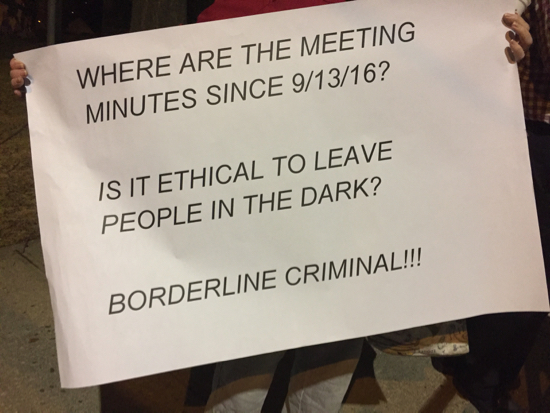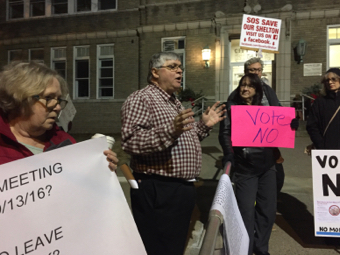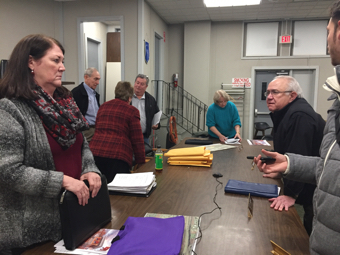 The City of Shelton recently published meeting minutes regarding a controversial development proposal, but only after a Freedom of Information complaint was lodged against the city.
The City of Shelton recently published meeting minutes regarding a controversial development proposal, but only after a Freedom of Information complaint was lodged against the city.
Minutes are supposed to be available for the public within seven business after the meeting.
In Shelton’s case, some minutes were not posted until 121 days after, an obvious violation of the state’s Freedom of Information Act, according to two FOI experts.
The oversight was because of a lack of staffing at Shelton City Hall combined with a lack of knowledge on open government laws.
The missing meeting minutes raised the ire of people who oppose the project. One resident said he brought it to the attention of Shelton government more than six months ago.
The Shelton Planning and Zoning Commission is considering its largest proposal in years, a proposed zone change to pave the way for a 121-acre mixed-use development off of Bridgeport Avenue.
There is an active and organized opposition to the zone change from neighbors. A Facebook group organized to oppose the development has nearly 1,600 likes.
A public hearing attracted hundreds of residents to speak out in opposition last spring, and about a dozen protesters stood outside city hall Jan. 19 urging the commission to reject the proposal.
Resident Greg Tetro made a sign for the protest asking “WHERE ARE THE MEETING MINUTES SINCE 9/13/16?”
The commission has talked about the proposal at four meetings since its Sept. 13 meeting. Yet there was no written record of the proceedings available to the public before the Jan. 19 meeting.
Tetro said it is suspicious when the city drags its feet on providing public information — especially when considering such a controversial development proposal.
“They are doing this to hide the information from the public who can’t be there,” he said.
 Tetro said he first complained about minutes not being filed on time last spring. His concern: “people can’t fight what people can’t see.”
Tetro said he first complained about minutes not being filed on time last spring. His concern: “people can’t fight what people can’t see.”
“They’ve claimed to be trying to fix it since May,” he said. “I think nine months is more than enough time.”
In an interview immediately after the Jan. 19 meeting, Ruth Parkins, chairwoman of the Shelton Planning and Zoning Commission, said written meeting minutes were not required.
Parkins said audio recordings of the meetings were available at Shelton City Hall for the public.
“The minutes are on tape. There’s a tape-recording of all the minutes. The actual motions are recorded as minutes,” she said. “The Freedom of Information (Act) does not require paper minutes. It requires a recording of the meeting.”
Parkins’ interpretation of the law is not correct.
Tom Hennick, the public information officer for the Connecticut Freedom of Information Commission, said that in addition to recording meetings, public agencies are required to file written minutes of their gatherings.
Dan Klau, a lawyer who also serves as the president of the nonprofit Connecticut Council on Freedom of Information, agreed.
People who want to know what their government is doing shouldn’t be forced to spend several hours hunched over a tape player in City Hall.
“Her understanding, to the extent that she believes that the minutes requirement of the Freedom of Information Act is satisfied simply by having an oral recording, that is incorrect,” he said. “The Freedom of Information Act requires written minutes.”
After the Jan. 19 meeting, Parkins herself expressed frustration about the minutes not being filed.
 “I rely on those minutes myself. I’ve been expressing my unhappiness with the situation of the minutes. It’s not just something that’s shared by the residents,” she said. “The commission feels it as well because they like to go back and refer to the last meeting.”
“I rely on those minutes myself. I’ve been expressing my unhappiness with the situation of the minutes. It’s not just something that’s shared by the residents,” she said. “The commission feels it as well because they like to go back and refer to the last meeting.”
She blamed the lapse on staffing problems.
“A clerk left, the one that we hired did not work out. She was not providing the minutes. We ended up terminating her. We hired someone new,” Parkins said. “That person’s mother took ill, so she had to go take care of her mother and then she had a vacation scheduled. Things that are beyond the commission’s control, it’s a staffing issue. We are definitely working on the situation and hope to get it resolved as soon as possible.”
Klau said that reasoning doesn’t wash.
“You can’t use this kind of excuse as a justification for not conducting the public’s business publicly,” he said. “You just can’t.”
The FOI Act clearly defines when minutes are to be made available, he said — records of votes are to be made public in the town clerk’s office within two days. Minutes of meetings within seven days.
The minutes, by the way, do not have to be posted online.
Parkins said in an email Jan. 24 she had misunderstood the FOI Act.
“My comment after the meeting was based on information as I read in a CT FOI pocket size card, which indicates that there needs to be a form of record of the meeting,” she said. “While it lists multiple mediums including tape recordings, it does not explicitly state that a record of the meeting needs to be in written form, other than the votes of each member on any issue. I have since received clarification that written minutes do need to be prepared as well.”
“My position is voluntary and it is the responsibility of staff to ensure FOI requirements are met,” Parkins wrote.
The Valley Indy filed a complaint with the Freedom of Information Commission about the missing meeting minutes about 1 p.m. Jan. 20.
About 4 p.m. Zoning Administrator Rick Schultz called the Valley Indy to say that minutes of all the meetings since Sept. 13 had been filed in the clerk’s office.
The minutes filed are not comprehensive, but they don’t have to be, according to state law.
But the minutes look especially light weight when compared to past Shelton P & Z minutes, which were much more informative.
In addition, at least one of the documents is still in violation of the FOI Act, which says that “the votes of each member of any such public agency upon any issue before such public agency shall be reduced to writing.”
While the vast majority of the commission’s decisions were unanimous, the minutes note a 4-1 vote on an application for a “planned development district” on Old Bridgeport Avenue Dec. 13 — but did not note who voted in favor and who voted against.
 Mayor Mark Lauretti said more detailed minutes will be updated to the site at some point.
Mayor Mark Lauretti said more detailed minutes will be updated to the site at some point.
“A person was hired and was working on them. When the person got them done, they brought them in,” Lauretti said. “The last couple years it’s been more difficult than in previous years. These minutes are sometimes are very challenging, other times they’re not. We’re just in a bad spurt the last year and a half. I don’t know how else to explain it.”
“Eventually we’ll get caught up. It’s difficult to explain something to someone when they just want to be right,” the mayor said. “But believe it or not it’s not that easy to find someone who is capable of transcribing these meetings both timely and accurately.”
The commission is expected to consider a “favorable resolution” on the development application at their Feb. 14 meeting — which basically means that they are likely to approve the zone change with a number of conditions.
Meanwhile, the P&Z is considering more development across the street from the Shelter Ridge property — in the form of a hotel, a 145-unit luxury apartment building, restaurant, retail space, and an auto service center. Click here for more information.
This story is a collaboration of the Valley Indy and the Shelton Herald.